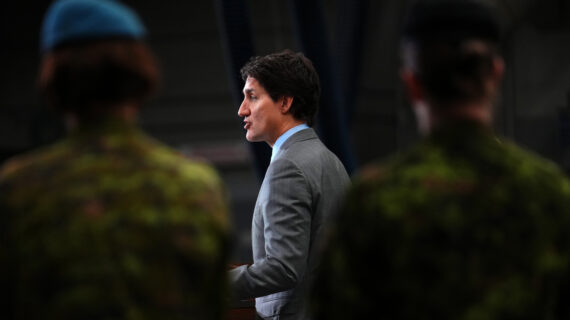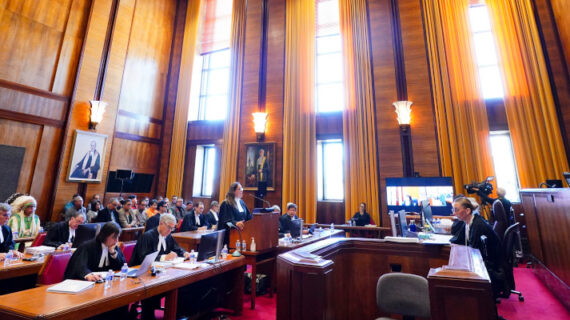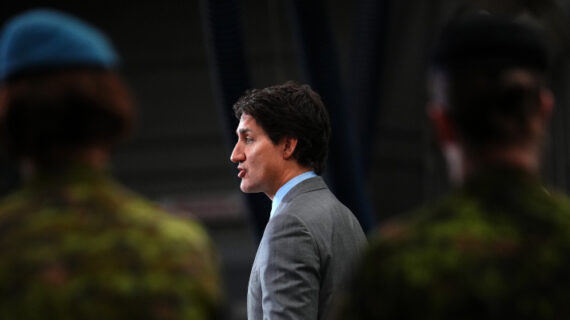- Strikes at the Vancouver and Prince Rupert ports are costing up to $250 million per day, which Howard Levitt says is pressuring the federal government to potentially implement back-to-work legislation.
- Larry Savage says the Liberals pride themselves as the party of the Charter of Rights and Freedoms, which protects the right to strike, which puts them in a difficult position.
- Brian Dijkema says the Conservatives have to balance consideration for the workers' rights to negotiate new wages with the strike's impact on all Canadians as the party moves to appeal to organized labour.
Economic damage from the strikes at the Port of Vancouver and the Port of Prince Rupert is piling up, but labour experts say the Liberals, and even the Conservatives, are less inclined to favour back-to-work legislation than ever before.
The strike action, and the political maneuvering it inspires, may be a sign of a new era in Canadian politics where all three major parties are now vying for organized labour votes and changing the landscape of the country’s politics in the process.
Since July 1, over 7,000 port workers represented by the International Longshore and Warehouse Union Canada, have been picketing to demand higher wages, and to protest the growing presence of non-unionized contractors at the ports.
The Liberal government has not proposed back-to-work legislation to end the strikes paralyzing two of Canada’s largest ports, and Larry Savage, a professor of labour studies at Brock University, says the Liberals have good reason to avoid doing so.
“The Liberals in particular pride themselves as being the party of the Charter of Rights and Freedoms, and so it’s a bad look when that party is seen as potentially violating Charter rights,” says Savage. “The right to strike, since 2015, has been read as part of the Constitution and that’s relatively new given the trajectory of labour rights in Canada.”
In 2015, the Supreme Court of Canada ruled that the right to strike was constitutionally protected on freedom of association grounds. Savage says Prime Minister Justin Trudeau’s criticism of Ontario Premier Doug Ford’s use of the Notwithstanding Clause, which allows governments to override certain provisions in the Charter, during last year’s CUPE strike further constrains the federal government’s options.
“Anytime you legislate someone back to work, the union is always going to be upset,” says Brian Dijkema. “I would say, most of the time, there’s good reason for the union to be upset. The reason we have collective bargaining is so the state does not need to be involved in the economic affairs of a corporation and its workers.”
Dijkema, vice president of external affairs at the Cardus Institute, has previously talked about the potential for closer ties between conservative political parties and organized labour. He says the decision to support or oppose back-to-work legislation is a tough call for both the Conservatives and Liberals, even though the strike is impacting the whole country.
“They want to respect the rights of workers to associate and negotiate their own wages, but at some point, does it become a question of national, and maybe even international interest, when there’s a whole host of people downstream,” says Dijkema.
The last Conservative government led by Stephen Harper frequently ended labour disputes with back-to-work legislation, but times have changed since 2015. Conservative leader Pierre Poilievre has urged the Liberals to end the strike, but has stopped short of calling for back-to-work legislation.
Poilievre has also made attempts to appeal to organized labour, including promising to streamline natural resource projects and boost domestic manufacturing, as well as frequently visiting unionized job sites.
Negotiations between the ILWU and the B.C. Maritime Employers Association to end the strike are ongoing, and on July 11, Minister of Labour Seamus O’Regan, who retained his post in Wednesday’s cabinet shuffle, gave a federal mediator 24 hours to recommend a set of terms to end the strike.
A tentative settlement was reached between the negotiators, only for the workers to reject the deal and resume the strike on July 18, without giving 72 hours notice, leading to O’Regan publicly declaring that the strike was illegal. ILWU’s leadership has recommended that the union’s members vote in favour of ratifying the latest proposed deal.
“We’re pleased to see that the ILWU Canada Longshore Caucus will be recommending ratification of the Terms of Settlement proposed by federal mediators to their membership,” read a statement from O’Regan’s office when asked for comment. “Right now, our B.C. ports are operating, but we need long-term stability. That’s what we’re focused on.”
An estimated $800 million worth of goods pass through the Port of Vancouver and into the Canadian supply chain every day, and some estimates place weekly losses from the strike at $250 million. Premiers across Canada, including Doug Ford and Alberta Premier Danielle Smith, have called on the federal government to implement back-to-work legislation.
Howard Levitt, senior counsel at Levitt Sheikh, a Toronto law firm specializing in labour law, says the government has the authority to pass the legislation, but it would break with its approach towards organized labour.
“It would be an absolute change of course, but one that they’ve been making noise about in this particular strike, and it’s one that has such a massive impact across the country, and in other industries in the economy generally, that they may not have a choice,” says Levitt.

During 2014, the last full year in office of the previous Conservative government, the federal lobbying registry recorded just four communications between the Canadian Labour Congress (CLC) and parliamentarians. Under the current Liberal government, the registry has recorded 136 communications initiated by the CLC in the last six months.
While the NDP have an agreement to support the Liberals in the House of Commons for specific issues, Savage says the NDP would vote against back-to-work legislation, possibly forcing the Liberal government to rely on the Conservatives to pass it.
“I think that Trudeau doesn’t want to be seen as in bed with the Conservatives to extinguish the workers’ right to strike, especially given the Liberal Party has worked so hard to kind of craft itself as a party of the middle class,” says Savage.
The Conservatives, however, may no longer be willing hawks when it comes to forcibly ending labour disputes.
Like many other right-of-centre parties worldwide, the Conservatives have attempted to make inroads with organized labour in recent years, following the example of the Republicans in the United States and the United Kingdom’s Tories. Previous Conservative leader Erin O’Toole praised the presence of unions in the lives of working and middle-class Canadians, citing his own upbringing as an example.
Some surveys conducted in the last 12 months have indicated that the Conservatives’ efforts are paying off, with a February Abacus poll indicating a plurality of unionized workers would vote for them.




